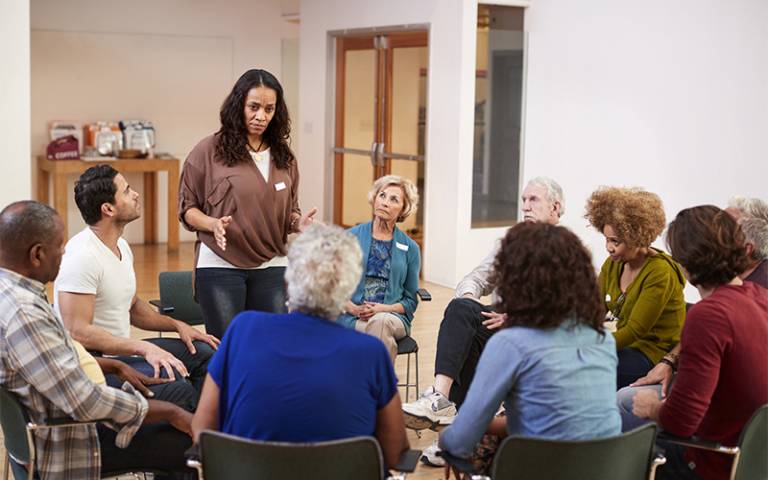Improving mental health research for underserved communities
23 February 2022
A new programme led by UCL researchers will tackle barriers to mental health and care research participation for underserved staff and communities in East London and Essex, seeking to ensure research advances benefit everyone.

The three-year programme, ‘Mental Health Research for All’, led by NIHR Applied Research Collaboration North Thames (ARC-NT), has been awarded £750K funding from the National Institute of Health Research (NIHR).
Evidence shows that communities living in the most disadvantaged areas of England have some of the highest numbers of people affected by poor mental health. People living in parts of East London and Essex experience higher rates of mental health conditions, serious mental illness and suicide compared to the rest of the country. However, they are less likely to use mental health services, have poorer access to high-quality care, and are underrepresented in mental health research.
Staff who work in mental health are also unequally represented, and there is a need to improve research opportunities for allied health and community staff.
The ‘Mental Health Research for All’ programme aims to understand and overcome barriers to mental health and care research participation for underserved staff, and communities living with mental health conditions, in parts of East London and Essex.
Programme co-lead, Professor Peter Fonagy (Head of UCL Psychology & Language Sciences and ARC-NT Mental Health Lead), said: “This is an important achievement for ‘levelling the playing field’ within the current mental health research landscape. Patients and staff should have equal opportunity to benefit from research, no matter where they are, their social circumstances or their diagnosis.
“This research will enable us to identify where barriers to research occur and, crucially, how we may be able to overcome these.”
The researchers seek to build mental health research capacity and capability among staff working in NHS Trusts, local government, public health, social care and community care. This approach builds on valuable partnerships with NHS providers and Trusts in East London and Essex. Through strengthening and expanding on these partnerships, they will ensure that future mental health interventions and support are inclusive and reflect the diverse needs and lived experiences of local staff, systems, patients and communities.
This includes:
- adapting and developing tailored training courses for mental health staff
- funding training posts (for example, studentships and career development fellowships) for staff groups that are identified as a priority, for example community workers, peer support workers and social care staff. These posts will be designed to specifically address underserved mental health conditions and socio-demographic groups
- Establishing a network of ‘Research Champions’ who promote mental health research awareness, activity, and implementation
- Facilitating peer learning support and mentoring by connecting staff with established researchers
- Offering internships for the next generation of mental health researchers
The programme is a partnership between UCL, City, University of London and UCLPartners. It is being led by Dr Jenny Shand (UCL Psychology & Language Sciences, UCLPartners, and ARC-NT Implementation Lead), Professor Fonagy, and Professor Rosalind Raine (Head of UCL Department of Applied Health Research and ARC-NT Director).
Dr Shand said: “We are delighted to have secured funding to widen the reach of mental health research in East London and Essex – to improve patient and public participation and to expand the settings and staff groups that are involved in delivering research. Equity, diversity and inclusion are central to our approach and critical to making progress. We hope the work will have significant local impact and be relevant nationally for others to learn and build upon.”
A diverse, open and inclusive culture will be the foundation of this work. Researchers will be working with a range of allied health, clinical, and voluntary staff, patients, carers and public contributors to develop and deliver the programme, and to support people with lived experiences to be research partners. Members of the ARC-NT Patient and Public Involvement and Engagement committee co-developed the research proposal that was awarded this funding, and will continue to sit on the research panel, advising on research strategy, delivery, and activities, as well as future plans.
The research team says that building research capacity among people with lived experiences, and those working at the frontline, of mental health, will be crucial to creating a more inclusive and equitable research culture - one that better represents and supports underserved communities and mental health conditions.
Karen Williams, ARC-NT public contributor for mental health, said: "This important work is led by a clear evidence base, focusing on where resources and additional support are most needed. At its core is a total commitment to diversity and inclusivity, both within communities and across staff working in all areas of mental health research.
"The collective understanding and expertise of everyone involved, to develop a programme that places the needs of communities and staff at its centre, has been a privilege to be part of. I look forward to continuing our work to help ensure key learning and outcomes have a lasting legacy for all those involved.”
Links
- Professor Peter Fonagy's academic profile
- UCL Psychology & Language Sciences
- UCL Department of Applied Health Research
Source
Image
- Credit: Monkeybusinessimages on iStock
Media contact
Chris Lane
Tel: +44 (0)20 7679 9222
Email: chris.lane [at] ucl.ac.uk
 Close
Close

